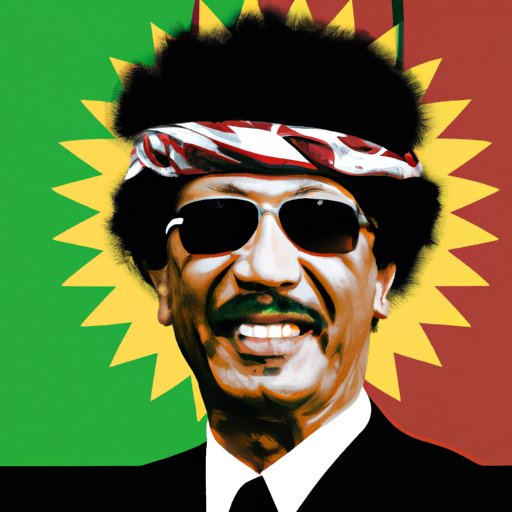Introduction
Leadership is the ability to influence and inspire others for the purpose of achieving a common goal. In the case of Muammar Gaddafi, who served as the leader of Libya from 1969 to 2011, his leadership style was often characterized by authoritarianism and a strong emphasis on nationalism. In this article, we will explore Gaddafi’s leadership style and its impact on Libya, both during his rule and in the years since his death. We will examine his domestic policies, foreign relations, involvement in regional conflicts, and legacy in modern Libya. Additionally, we will compare Gaddafi’s leadership to that of other North African leaders.
A Historical Analysis of Gaddafi’s Rule in Libya
Gaddafi first came to power in 1969, when he led a military coup that overthrew the Libyan monarchy. He quickly established himself as an authoritarian leader, ruling with an iron fist and enacting sweeping reforms to the country’s political and economic system. During his rule, Gaddafi nationalized industries and introduced a wide range of social programs, such as free healthcare and education. He also sought to promote pan-Arabism, a movement that aimed to unify the Arab world under a single government.
Examining Gaddafi’s Domestic Policies
Gaddafi’s domestic policies had both positive and negative consequences. On the one hand, his reforms helped to improve living standards for many Libyans. For example, his nationalization of industries resulted in higher wages for workers and improved access to basic services. Additionally, his social programs provided access to healthcare and education for all citizens. On the other hand, Gaddafi’s rule was marked by widespread human rights abuses. Political dissidents were routinely imprisoned or executed, and freedom of speech and assembly were heavily restricted. Furthermore, Libya’s economy suffered due to the government’s heavy-handed intervention and mismanagement.
Assessing the Positive and Negative Consequences of Gaddafi’s Policies
In terms of social and economic development, Gaddafi’s policies had mixed results. On the one hand, his reforms helped to reduce poverty and inequality, and improved access to healthcare and education. On the other hand, these gains were offset by rising unemployment, high inflation, and a lack of economic diversification. In terms of politics, Gaddafi’s rule was marked by authoritarianism and a disregard for human rights. The government maintained strict control over the media and opposition groups, and political dissent was harshly punished.
Exploring Gaddafi’s Relationship with the West
Gaddafi’s relationship with the West was complex. Early in his rule, he sought to strengthen ties with Western nations, particularly the United States. However, his foreign policy shifted in the 1980s, as he increasingly aligned himself with anti-Western regimes in the Middle East and North Africa. This shift was largely motivated by Gaddafi’s opposition to the US-led war in Iraq and his support for militant groups in the region. In response, the US imposed a series of sanctions on Libya, which weakened the country’s economy and damaged its diplomatic standing.
Investigating Gaddafi’s Role in Regional Conflict
Gaddafi was an influential figure in regional conflicts throughout his time in power. He supported militant groups in countries such as Lebanon, Syria, and Iraq, and played a key role in mediating disputes between rival factions. Additionally, he was actively involved in negotiations with Israel, though these ultimately failed to result in a lasting peace agreement. Despite his efforts, Gaddafi’s actions often exacerbated regional tensions, and his involvement in regional conflicts has been criticized by some observers.
Evaluating Gaddafi’s Legacy in Modern Libya
Gaddafi’s legacy in modern Libya is complicated. While some Libyans view him positively, citing his economic reforms and strong stance against foreign interference, others see him as a brutal dictator whose policies caused great suffering. His death in 2011 sparked a civil war that has left the country in chaos, and his rule is still a source of controversy and debate in Libya today.
Comparing Gaddafi’s Leadership to That of Other North African Leaders
When compared to other North African leaders, Gaddafi stands out in several ways. Unlike his contemporaries, he remained in power for more than four decades, and his rule was marked by an emphasis on nationalism and pan-Arabism. Additionally, his foreign policy was more confrontational than that of other leaders in the region, and he was willing to use military force to achieve his goals. Ultimately, Gaddafi’s leadership style was unique, and its legacy continues to be felt in Libya today.
Conclusion
In conclusion, Muammar Gaddafi’s leadership style and impact on Libya are complex and controversial. While he implemented a number of reforms that improved living standards for many Libyans, his rule was marked by authoritarianism and human rights abuses. Additionally, his foreign policy was often confrontational and his involvement in regional conflicts exacerbated tensions in the region. In the end, Gaddafi’s legacy in modern Libya is still being debated and his actions remain a source of controversy.
(Note: Is this article not meeting your expectations? Do you have knowledge or insights to share? Unlock new opportunities and expand your reach by joining our authors team. Click Registration to join us and share your expertise with our readers.)
